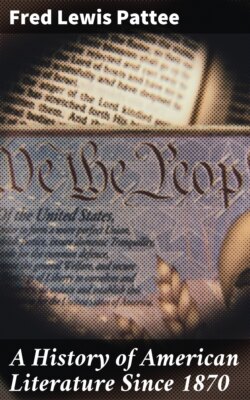Читать книгу A History of American Literature Since 1870 - Fred Lewis Pattee - Страница 32
На сайте Литреса книга снята с продажи.
I
ОглавлениеTable of Contents
To turn from Mark Twain to Bret Harte is like turning from the great river on a summer night, fragrant and star-lit, to the glamour and unreality of the city theater. No contrast could be more striking. Francis Brett Harte, born August 25, 1839, was preëminently a man of the East and preëminently also a man of the city. He was born at Albany, New York, he spent his childhood in Providence, Rhode Island, in Philadelphia, in Lowell, Massachusetts, in Boston and other places, and the formative years between nine and eighteen he passed in Brooklyn and New York City. He lived all his young life in an atmosphere of culture. His father, a Union College man, a scholar, and a teacher who knew French and Spanish and Italian, Latin and Greek, had accumulated a large and well-selected library in which the boy, frail and sensitive, too frail in his early years to attend school, spent much of his childhood, reading Shakespeare and Froissart at six and Charles Dickens at seven. His mother, a woman of culture, directed his reading, and criticized with discernment his earliest attempts at poetry. It was the training school for a poet, a Bryant or a Longfellow, who should look to the older art for models and be inspired with the dream that had sent Irving and Willis and Taylor as pilgrims to the holy lands of literature across the sea.
The turning point in Harte's life came in 1854, when he was in his fifteenth year. His biographer, Merwin, tells the story:
In 1853 his mother [who had been a widow for nine years] went to California with a party of relatives and friends, in order to make her home there with her elder son, Henry. She had intended to take with her the other two children, Margaret and Francis Brett; but as the daughter was in school, she left the two behind for a few months, and they followed in February, 1854. They traveled by the Nicaragua route, and after a long, tiresome, but uneventful journey, landed safely in San Francisco.[39]
The mother must have remarried shortly after her arrival in California, for two sentences later on the biographer records that "They went the next morning to Oakland across the Bay, where their mother and her second husband, Colonel Andrew Williams, were living."
The young poet had been transplanted into new and strange soil and he took root slowly. During the next year, making his home with his mother at Oakland, he attempted to teach school and then to serve as an apothecary's assistant, but he made little headway in either profession. His heart was far away from the rough, new land that he had entered. He wrote poems and stories and sketches and sent them to the Eastern magazines; he read interminably, and dreamed of literature just as Aldrich and Timrod and Hayne and Stedman and Stoddard were even then dreaming of it on the other side of the continent.
The next two years of his life, despite the efforts of his biographers, are vague and conjectural. It was his wander period. He began as tutor in a private family in Humboldt County, then, according to Charles Warren Stoddard, "he was an express messenger in the mountains when the office was the target of every lawless rifle in the territory; he was glutted with adventurous experiences."[40] Not for long, however. He seems to have spent the rest of the two years—prosaic anticlimax!—as a type-setter on the Humboldt Times and the Northern California, as a teacher in the town of Union, and as a drug clerk. That he ever was a miner is gravely to be doubted. He had small taste for roughing it and little sympathy with the typical California life of the times. He was a poet, rather, a man of the city, a reader of romance, how wide and attentive a reader we may judge from Condensed Novels which he soon after began to contribute to the San Francisco press.
The events in his life during the next fourteen years in San Francisco are quickly summarized. For the greater part of it he was connected with the Golden Era, first as a type-setter and later as an editor and contributor. In 1862 he was married. Two years later he was appointed Secretary of the California Mint, an office that allowed him abundant time for literary work. He was connected with Webb's brilliant and short-lived Californian, first as contributor and later as editor, and in 1868, when the Overland Monthly, which was to be the Atlantic of Western America, was founded, he was made the editor. The Luck of Roaring Camp in the second number and Plain Language from Truthful James in the September, 1870, number, brought him a popularity that in suddenness and extent had had no precedent in America, save in the case of Mrs. Stowe and Uncle Tom's Cabin. The enormous applause intoxicated him; California became too narrow and provincial; and in 1871 he left it, joyous as one who is returning home after long exile.
